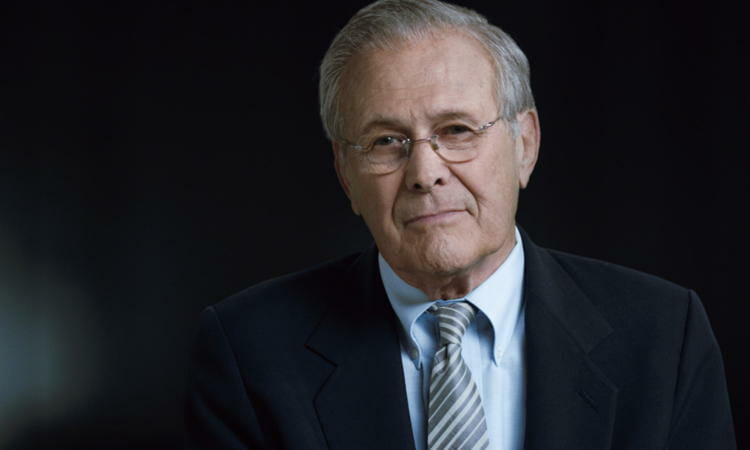By Ural Garrett · March 26, 2014

“There are known knowns. There are known unknowns. There are unknown unknowns. But there are also unknown knowns – that is to say, things that you think you know that it turns out you did not.”
An intimate and insightful look into Donald Rumsfeld’s controversial political career, director Errol Morris allows the two-time United States Secretary of Defense to speak for himself in The Unknown Known. Feeling more like a coffee table conversation than formal interview, the 102-minute documentary revolves around Rummy reading and giving context to his “snowflakes.” For those unfamiliar with the subject, snowflakes were Rumsfeld’s extensive memo archives, essentially framing his time as an Illinois congressmen to highly loathed member of George W. Bush’s administration. In fact, his time with Dubya alone produced 20,000 memos. The Unknown Known could have easily become a longwinded attempt for the polarizing politician to explain himself. However, taking a more “from the horses mouth” approach lends a captivating frame of reference to key moments in Rumsfeld’s history.
Rumsfeld continually contradicts himself as The Unknown Known primarily focuses on his role in the disastrous Iraq War. That’s absolutely fine however. The film’s message isn’t necessarily to condone or berate his decisions; it’s to lend perspective. Hell, even Rumsfeld understands his own self-countering at times. Taking its title from his infamous proclamation during a 2002 press briefing only serves to drive home the point.
The Unknown Known fascinatingly paints the former Navy captain as tactfully meticulous yet unknowingly unprepared. Rumsfeld mentions when discussing his working with various presidents ranging from Gerald Ford to Richard Nixon that for each lesson learned from a predecessor, there are unique potholes that arrive eventually. Considering time spent in office, he’s seen more than his fair share. For a man who’s had first hand accounts of everything from Gerald Ford’s assassination attempt to the September 11’s attack on the Pentagon, his assertion of “peace through strength” come off as transparent. It’s quite spellbinding to watch Rumsfeld use the attack at Pearl Harbor and the United State’s “failure of imagination” to justify aggressive military measures in the middle east.
This makes answers of confusingly asked questions from Morris intriguing to watch as Rumsfeld sits confidently and apparently goes through his internal rolodex of thoughts for responses. There’s a impression that it’s not Morris who’s asking the questions, but viewers themselves.
Will The Unknown Known change anyone’s thoughts on the Iraq War? Not really. Those who were against initial war efforts will surely have enough conversational ammo to disprove any of Rumsfeld’s statements. Supporters of the war that brought down Saddam Hussein can rest assure that its key architect made the right decisions. Everyone else, expect more questions and even more uncertainty. Maybe that was the idea in Morris’ most unconventional documentary since his Oscar winning The Fog of War: Eleven Lessons from the Life of Robert S. McNamara. There isn’t a point The Unknown Known exactly tries to make which purposefully eliminates potential claims of bias though that’s probably inevitable. It’s just Rumsfeld and those snowflakes.